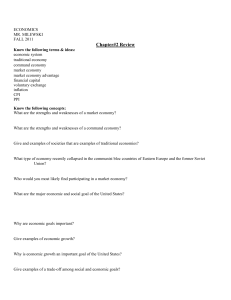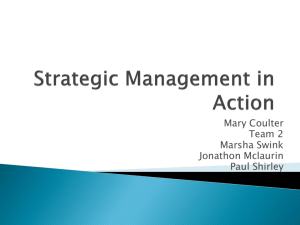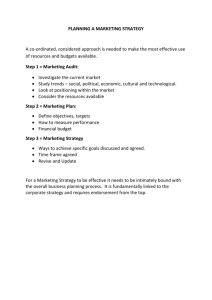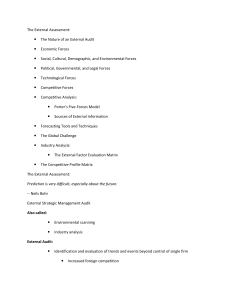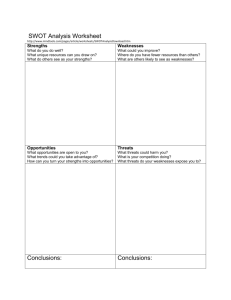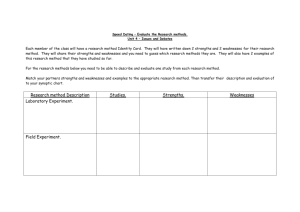File
advertisement
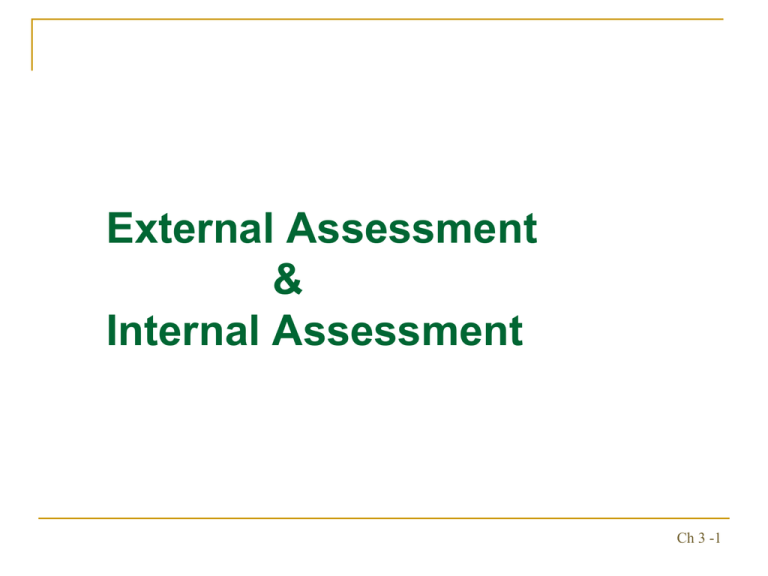
External Assessment & Internal Assessment Ch 3 -1 External Assessment …. Also called; • Environmental scanning • Industry analysis Ch 3 -2 External Audit/ scanning Identification & Evaluation of factors/events/trends beyond the control of a single firm Increased foreign competition Changes in lifestyles Information technology/ computer revolution Ch 3 -3 Categories of External Forces • Economic • Social, and environmental • Political, governmental, and legal • Technological Ch 3 -4 What does External Audit help? It helps in getting competitive intelligence on factors; • Social • Economic • Political and legal • Technological Ch 3 -5 Sources of information include • • • • • • Magazines, journals.. Internet Libraries ( university, public) Suppliers Distributors Customers Ch 3 -6 Economic forces Monitor key economic variables; • Availability of credit (Interest rates) • Level of disposable income • Consumption pattern • Inflation rate • Tax rates Ch 3 -7 Economic forces • Example when interest rates rises, funds needed for capital expansion becomes more costly and unavailable. Ch 3 -8 Social, Demographic & Environmental Forces (cont’d) Key variables may be; • Environmental concerns(tsunami) • Changing life styles • Average level of education • Buying habits (less book reading) Ch 3 -9 Social, Demographic & Environmental Forces (cont’d) Example. United States is much more different today than it was yesterday, and tomorrow promises greater changes. These factors shapes the way people live work, produce and consumes. Changes in these factors are creating different types of consumers, different products , different services and different strategies. Ch 3 -10 Political, Government & Legal Forces (cont’d) Government Regulation can pose Key opportunities and key threats • Tax rates (Tax law changes e.g. income tax, sales tax,) • Environmental protection laws (like NEPA in afghanistan) Ch 3 -11 Political, Government & Legal Forces (cont’d) • • • • Import export regulations(custom tax) Location and severity of terrorist activities Employment laws(hiring, firing laws) Compensation laws(salary, bonus, increments) etc. Ch 3 -12 Political, Government & Legal Forces (cont’d) Example. Russian tax policy is too complex and changes so frequently that every organization keeps off the books to avoid paying taxes . It is impossible to run a successful business in Russia because of frequent changes in these factors. Many companies have abandoned their strategies because of the political and Ch 3 -13 governmental actions Technological forces Technological forces represent major opportunities and threats that must be considered in formulating strategies. Technological advancement can dramatically affect organization’s products, services, marketing practices and competitive position of a firm. Ch 3 -14 Technological forces Example: In office supply industry, business customers find that purchasing supplies over the internet to be more convenient than shopping in a store. Ch 3 -15 Internal Audit Ch 3 -16 Internal Audit/Scanning Parallel process with external audit •Information from: • Management • Marketing • Finance/accounting • Production • Research & Development Ch 3 -17 Internal Audit All organizations have strengths and weaknesses in the functional areas of business. Functional areas of a business are customer services advertizing packaging Strengths are usually capitalized to improve the weaknesses and turning them into strengths and may be into competitive competencies. Ch 3 -18 Examples of strengths & weaknesses Japanese have been able to invade the US auto markets successfully, because they have proved that the quality of their cars is better than american cars. In this example strength of Japanese cars is their comparatively good quality. The weakness of american cars is their comparatively low quality. Ch 3 -19 Examples of strengths & weaknesses Strategic management process is a highly interactive process that requires effective coordination among management , marketing, finance, production, R & D etc. E.g. A declining result on investment could be the result of ineffective marketing, poor management policies, research and development errors. Ch 3 -20 Management Function Planning Strategy Formulation Organizing Strategy Implementation Motivating Strategy Implementation Staffing Strategy Implementation Controlling Strategy Evaluation Ch 3 -21 Marketing Marketing Functions 1. Customer analysis 2. Selling products/services 3. Product & service planning 4. Pricing 5. Distribution 6. Marketing research Ch 3 -22 Finance /Accounting Financial condition is often considered the single best measure of a firm competitive position and overall attractiveness to the investor . Determining an organization’s financial strengths and weaknesses is essential to formulate strategy effectively Ch 3 -23 Production The production function of a business consist of all those activities that transforms inputs into goods and services. Process Capacity Workforce Quality Ch 3 -24 Production audit checklist 1= raw material is of good quality 2=Are facilities, equipment, machinery and offices is in good condition. 3=Are quality control policies are effective. 4=Does the firm have technological Ch 3 -25 Research & Development One of the major area of internal operations that should be examined for specific strengths and weaknesses is research and development. R&D is mainly concerned with developing new products, improving product quality, improving manufacturing efficiency and broadening the company’s technological capabilities. Ch 3 -26 R & D Audit Checklist 1=Do we have R & D facilities. 2=Are R & D facilities effective. 3=Are the organization R & D personnel well qualified. 4=Are present products technologically competitive. Ch 3 -27

